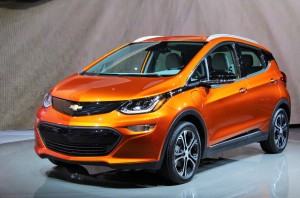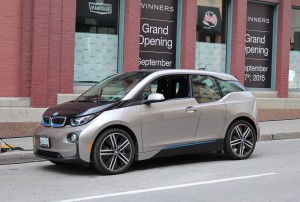Is the 2017 Chevrolet Bolt the electric car that finally goes mainstream?
The Prius of pure EVs?
That seems to be the goal for General Motor’s all-electric five-door, which was piloted onto the stage by GM CEO Mary Barra herself during its quasi-debut at the North American International Auto Show in Detroit this month.*
* (The Bolt was first revealed at the Consumer Electronics Show in Las Vegas the previous week)
So far, pure EVs have sold in relatively limited numbers due to a combination of low driving range at the low end of the market and high cost at the top end. The painfully slow proliferation of charging infrastructure hasn’t helped a nervous public ditch their combustion-powered vehicles, either.
The Bolt’s job is to eliminate range anxiety and do it at a price deemed ‘affordable’ for middle class car buyers. With an estimated range of 200 miles (320 kilometres), a price of $30,000 U.S. (after government incentives), and a spacious liftback body designed for family and cargo), GM feels it’s found a happy medium that will appeal to the maximum number of consumers.
Will it sell like umbrellas at Heathrow Airport? Time will tell, but the clock is ticking for any automaker looking to snatch the ‘Everyman EV’ crown.
When it hits dealer lots this fall, the Bolt has to make miles not just on the road, but on the gathering competition.
In the rear-view is the venerable Nissan LEAF, which received a modest range boost in 2016 (approximately 170 kilometres) ahead of a 2018 revamp that could see it surpass the Bolt in miles per charge.
BMW’s interestingly proportioned i3 gets a 50 percent range boost next year as well, pushing its outer limit to approximately 193 kilometres, minus the optional range-extender.
Somewhere out there in the ether, Tesla’s long-anticipated Model 3 is nearing a post-planning phase. While details of the entry-level Tesla are scarce, and price points and release date the subject of rumours, a more affordable Tesla with a range exceeding 200 miles should strike fear into the heart of any EV maker.
Still, the Model 3 doesn’t seem all that near, and Tesla currently seems quite preoccupied with working out the bugs with its fancy-doored Model X and delivering the luxury SUV to customers.
So it looks like the Bolt will have the high-range/low-cost market to itself for a little while, at least. Will lack of direct competition make the model shine on the sales sheet? Or will low oil prices, a diverse crop of plug-in hybrids, and lingering consumer nervousness around full-EV vehicles keep the Chevrolet Bolt in the sales slow lane?
We wait.


